
Ultimately, I hope that you’ll come away from it with some ideas on how you can improve yourself both personally and professionally.
I’m a professional content writer. Every month I write 10+ executive-level professional articles and edit many others as well. I spend a lot of time behind a keyboard, and yet, I didn’t know how to type. And I don’t mean I was “bad” at typing, I mean I didn’t even know where your fingers were supposed to go.
How did I get to be a mid-career professional in a typing-heavy profession without knowing how to type?
I guess I never tried to specifically hide that fact that I couldn’t type, but I certainly wasn’t publicizing it until one day my son came home from school beaming about how the first graders were learning how to type and asking when we learned how to type. It was then that I had to confess that he was probably more adept than me already. My husband and son were both shocked to learn that I spent as much time on the computer as I did and had been doing It wrong all these years (apparently no one ever noticed!). Now, it would be a really moving story if that shame was the impetus to me making the commitment to learn, but inherently human beings are often fearful of change and all the same time limitations existed, so I stayed stuck in my broken typing.
About a year and a half later I was talking to my best friend, and I don’t even remember how it came up, but I confessed that I peck-type and she simply said, “Wow, really? You should learn how to type!” She said it with such confidence and fluidity like it wasn’t something I had ever considered before. And then a strange thing happened – when I gave her all the excuses I had always told myself, they seemed really stupid. So, I decided to give it a try.
Now, this is the point in the story where I realize I’m actually a typing savant and live happily ever after, right? You know, where my inner dormant typist magically awakens and somehow everything I learned in elementary school comes flooding back to me and I’m instantly amazing at typing and people break into song, right? Nope! I was TERRIBLE.
I was painfully bad, and I hated trying to learn. At the end of my first lesson, I was typing at 8 wpm, which was far cry from the 60wpm that I could do peck-typing. I was so frustrated by how slow I needed to go to learn anything and how many mistakes I made that I dreaded the 15 minutes a day that I promised myself I would commit to learning how to type. I yearned for the timer to go off to tell me that I could go back to my ultra-speedy broken peck typing so that I could feel like I was excelling at something.
I felt like the problem was I had chosen something to learn how to do something right that I already knew how to really well wrong. I convinced myself that if I had tried to learn an entirely new skill that I would be doing better. Deep down I knew that wasn’t true because I have seen people struggle through learning a new language or mastering a new hobby, but the constant comparison to how I already knew how to do it was a painful reminder of my mediocrity. I was also kicking myself for trying to improve something that was so essential to my day-to-day life.
I told my best friend that it was slow going and didn’t hide my embarrassment and she simply said, “It’s hard not to be amazing at things but you have to start somewhere.” It was so comforting, and I genuinely understood what she was saying, but it still felt like this was going to take forever.
So, I changed my strategy. I realized that by only working on my typing 15 minutes a day I wasn’t going to make the kind of progress I wanted to see over the timeframe I wanted to see it. I needed more practice, but I really didn’t have a bunch of extra time to devote to it. Then, I realized that what I thought was a negative, was actually a positive – I was trying to improve something that I do all the time, which meant that I had tons of opportunities to work on it at my fingertips (literally)!
I decided to start using 10-finger typing while working. I couldn’t start with writing articles because that was too big of a jump, so I started with emails and messages. This was doable and easier than I thought it would be. My typing was getting better, and I was moving through the lessons more quickly. As a result, I took a big leap of faith and tried writing an article with correct typing form. It took a while but, oddly enough, I kind of enjoyed it. As it turns out, the less I stunk at it, the happier I was to keep plugging away at improving. I had overcome some sort of beginner’s hump. The lessons started feeling like a game where I was competing against myself to try to increase my speed and I actually looked forward to them!
And, the next thing I knew, exactly a month after starting to learn how to type I had passed the beginner, intermediate, and advanced assessments and was typing at 50+ wpm with high accuracy.
This is the power of getting started!
How to Succeed at Any New Skill
Now, if the purpose of sharing this was to brag, the story would end here. But I think it’s important to note a few key takeaways, because my story is hardly unique. Everyone who has ever tried something new has felt the way I felt and struggled the way I struggled. Sometimes the end result is giving up (I’ve done that plenty of times with other things), but sometimes the end result is finding success. That’s why it’s so important to remember that the outcome of your efforts is not simply a result of your mindset going into it. It’s also largely dependent on your approach!
Here are my key takeaways:
- Don’t be held captive by your own fear - genuinely believe that you can do it and then go all in!
- There will never be a “right time” to start, so just get started now!
- Use technology to help. (I used a popular online typing skills builder software to teach me how to type but technology exists to help with everything you want to do these days.)
- Look for ways to turn what seems like your biggest pain points into advantages to fuel your success.
- Remember that you’re likely your biggest critic. It’s quite possible that no one else even sees how foolish you feel as you’re learning, so don’t worry about what other people think. Just be kind to yourself throughout the process.
- Lean on others for accountability and encouragement when things get tough.
- Adapt as needed. Make a plan, but feel free to deviate from it when you see fit in order to realize the kind of success you want to see.
- Remember that your feelings in any given moment are temporary. Eventually it’ll feel good, and you’ll thank yourself for all the hard work you put in along the way.
If you use any of these tips to learn a new skill, let me know. I’d love to hear about what you’re learning and trying!

 RSS Feed
RSS Feed
